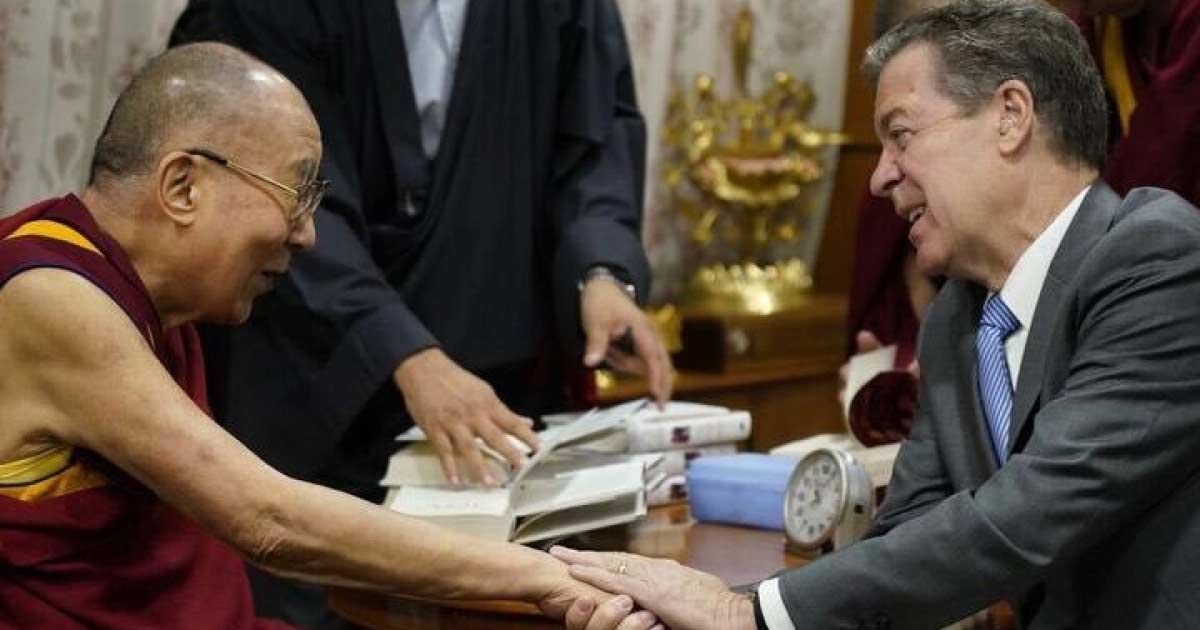
US Ambassador for International Religious Freedom Sam Brownback with His Holiness the Dalai Lama in Dharamsala on Oct. 28, 2019.
A US ambassador traveled today to the exile home of the Tibetan people and delivered a strong message to China: the United States believes no government has the right to interfere in selecting the next Dalai Lama.
Sam Brownback, ambassador-at-large for international religious freedom, met with the Dalai Lama at his residence in Dharamsala, India, today, Oct. 28, 2019.
According to the Central Tibetan Administration (CTA), which provides democratic governance for Tibetan exiles, Brownback’s delegation said the main purpose of their visit was to tell the world—especially China—that America supports the Tibetan people and that the right to determine the Dalai Lama’s successor lies solely with him and with the Tibetan Buddhist community, not with any outside government or entity.
Inspired and deeply moved after my meeting with His Holiness @DalaiLama in #India. He is living testament of the power of #religiousfreedom to overcome hate, division, and intolerance. I’m stirred in my own faith to work harder for #religiousfreedom for all, including Tibetans. pic.twitter.com/dngi5Im4Ts
— Ambassador Sam Brownback (@IRF_Ambassador) October 28, 2019
In a speech later at the first-ever international conference of Tibetan performing arts, Brownback noted that Tibetans unanimously passed a resolution at a general meeting earlier this month stating that China has no right to interfere in the reincarnation of Tibetan Buddhist leaders.
“Let me be clear: The United States shares that view,” Brownback said. “We believe that Tibetans, like all faith communities, must be able to practice their faith freely and select their leaders without interference.”
Brownback added: “The international community must work together now to make clear we stand unequivocally with the people of Tibet.”
Brownback arrived in Dharamsala on Oct. 27 and was received by CTA President Dr Lobsang Sangay.
Tibetan Policy and Support Act
For years, the Chinese government has absurdly claimed it has the right to approve the selection of the next Dalai Lama once the current one, now 84, eventually dies.
China has brutally occupied Tibet, a historically independent county, since it forced the Dalai Lama into exile 60 years ago.
As Brownback spoke in India, momentum was continuing to build in the US for the Tibetan Policy and Support Act, a new bill that will upgrade US support for Tibet and impose sanctions on any Chinese officials who attempt to appoint a future Dalai Lama.
Rep. James McGovern (D-Mass.) introduced the bipartisan bill last month in the House of Representatives, where it now has 14 co-sponsors, and Sen. Marco Rubio (R-Fla.) introduced it in the Senate, where there are now seven co-sponsors.
Last week, Tibetan associations advocated for the bill during the International Campaign for Tibet’s mini-Lobby Day, which brought Tibetan Americans and Tibet supporters to Capitol Hill and to senators’ and representatives’ offices around the country to ask them to support the legislation.
US promoting dialogue between China and Tibetans
During his remarks in Dharamsala, Brownback praised Tibet’s unique cultural identity. He said that Tibetan culture is a “treasure of humanity” and that China’s attempts to destroy it “are an affront to the civilized world.”
Brownback reiterated his calls for China to release the Panchen Lama or at least make the world aware of his fate. The Panchen Lama was abducted by China as a six-year-old boy in 1995. In a possible preview of how it will handle the Dalai Lama’s eventual succession, China then installed its own, fake Panchen Lama, whom it is now sending to Buddhist conferences in foreign countries.
Brownback also said the US government is continuing to push for dialogue between the Chinese government and the Dalai Lama’s representatives.
“US government officials, including the vice president, as well as officials from the US consulate in Chengdu and US embassy in Beijing, continue efforts to establish conditions that will lead to a direct and meaningful dialogue between [People’s Republic of China] authorities and His Holiness [the Dalai Lama] or his representative without preconditions that leads to a sustainable settlement,” Brownback said.
There has been no formal dialogue between Tibetans and Chinese since 2010. Under the Tibetan Policy and Support Act, the special coordinator for Tibetan issues in the State Department will be required to encourage China to negotiate with the Tibetan side.
Brownback also said Americans have a deep respect for Tibetans’ language, religion and culture and that the people of the US share a strong affinity with the people of Tibet.
Said Brownback: “The ties between Americans and Tibetans grow ever closer each year.”

